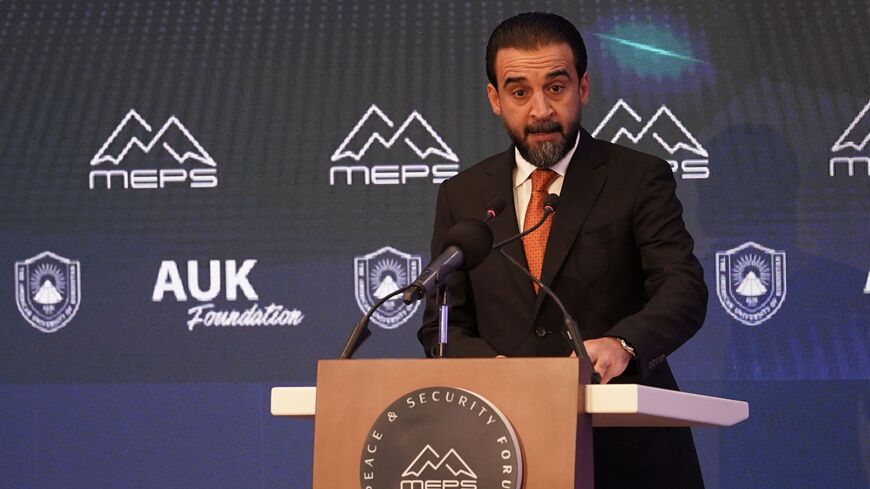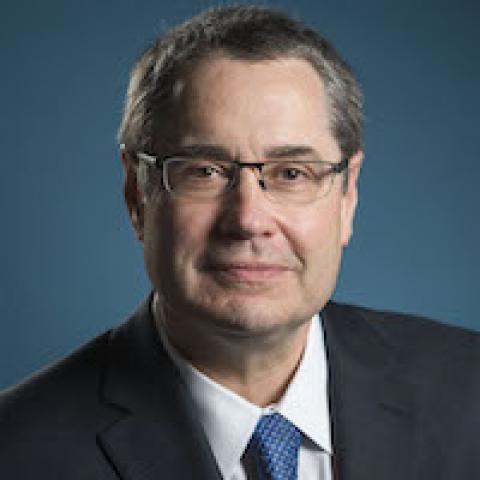ERBIL, Iraqi Kurdistan Region — Mohammed Halbousi, speaker of the Iraqi parliament, gave a rare interview with Al-Monitor in Erbil, the capital of the Kurdistan Region of Iraq. "The Arab Sunni community cannot go back to the past,” he said. “The future is now.”
Halbousi, 42, heads Al-Takadum (Progress) Movement, a Sunni political party that holds the largest number of seats (39) in Iraq's 329-seat parliament.
When Iraqi populist cleric Muqtada al-Sadr abruptly withdrew his party’s 73 representatives last fall, Progress went from the second to the top spot.
Progress is also a member of the ruling Coordination Framework political alignment, which is led by a coalition of Shiite parties and also includes the Kurdistan Democratic Party's (KDP) 31 seats.
Halbousi makes a compelling case for Iraq’s Sunni moment. The Sunnis were mostly sidelined from Iraqi politics following the US overthrow of Iraqi President Saddam Hussein. Al-Qaeda got a second life in Iraq and morphed into the Islamic State (IS), which in 2014 overran and terrorized vast areas of Iraq’s mostly Sunni towns and villages, including Mosul, Iraq’s third-largest city.
Since the defeat of IS in 2017, Iraq’s Sunni parties have rebounded under Progress to newfound power and influence in post-Saddam Iraq.
In addition to the political turnaround, Halbousi is credited with facilitating economic policies and projects that have led to the revival of Anbar and other Sunni regions.
“Everything that happens, I am accountable to my Sunni community,” he said. “The key is results: What are the benefits I take back to them?”
He added, “Progress is the alternative, and our people are prospering.”
As speaker of Iraq’s parliament, Halbousi oversees all of Iraq’s legislative business. In Iraq, he is referred to as one of "three presidents" along with Prime Minister Mohammed Shia al-Sudani and President Latif Rashid.
Like Sudani, Halbousi has lived his entire life in Iraq.
"An expressive image"
The speaker joined other Iraqi leaders as well as diplomats and guests from around the world in Barzan, in the Iraq Kurdistan mountains, for the commemoration of the Barzan National Museum, honoring the life and legacy of Mulla Mustafa Barzani. “The three Iraqi presidents — Prime Minister Sudani, President Rashid and myself — sitting together in Barzan, at the invitation of Kak Masoud Barzani, was an expressive image,” said Halbousi.
“The whole initiative and appeal among the leadership has been positive,” he added. “The relations are strong among our coalition partners, the KDP and the other Kurdish parties."
He put his assessment in the language of business.
“We believe that the cost of understandings and solutions is much less than the cost of disputes and confrontation,” he said. “Solutions are less expensive, easier to manage, when political feelings are calm.”
The challenges include the budget and hydrocarbon laws.
While Halbousi expects the budget to be approved soon with some modifications, the timeline for the hydrocarbons bill is more uncertain.
“The oil and gas law is different,” he explained. “Unlike the budget law, which is an annual exercise, the hydrocarbon legislation has far-reaching and long-term impact on the economy and infrastructure of the country. There are still some details to be worked out between the federal and Kurdistan regional governments.”
Halbousi emphasized that results are necessary to maintain the political goodwill on display in Barzan. Without them, he said, “We may lose this opportunity, and that opportunity might not come back.”
"Our neighbors are our destiny"
Halbousi gives priority to improved relations with Iraq’s neighbors, which he views as vital to stability and progress in Iraqi politics.
“These regional understandings impact the stability of our country, for sure,” he said. “Our neighbors are our destiny; we need clear understandings with them.”
He was cautiously optimistic about the recent Iran-Saudi rapprochement, while again looking for results to back up the diplomatic niceties.
“I should add that the recent Iran-Saudi agreement so far is just a declaration. We need to see what happens,” he continued. “There should be some practical steps like reducing the influence of arms and weapons in the area. In my talks with both parties, I've noticed some good intentions, but an overall resolution may take some time.”
Halbousi applauded the progress in deeper ties between Iraq and Arab countries that gained momentum under former Prime Minister Mustafa al-Kadhimi.
Here too, Halbousi believes more can be done to build on recent progress, and he referred to pending agreements before the parliament to deepen Iraq’s ties with several Arab countries.
“If you say Arab countries are my brothers, that's not enough with regard to economic relations with Arab states,” said Halbousi. “So we must increase our relations with them by two elements: both economy and security.”
Halbousi expressed disappointment with the US role in Iraq, implying Washington is not doing enough to support the country.
“Frankly, the role of the United States in Iraq is less than what it could be,” he said. “Its attention may be focused elsewhere.”
Young Iraqis want results
Because he is younger than many of Iraq’s power brokers, Halbousi exhibits what we might call a post-sectarian frustration with the status quo, characteristic among Iraq’s youth, across ethnic and sectarian lines.
“Iraq has suffered from these disputes between neighbors,” said Halbousi. “The youth of our society have lived their lives in the shadow of regional conflicts, and their negative consequences have taken a heavy toll on them, and on all Iraqis.”
“They are looking for a better future in Iraq,” he said. “This is the perception of Iraqi youth: They are waiting for results, not words, that they can welcome. Iraqi youth, and Iraqi society as a whole, will never accept interference from outsiders in our affairs.”







